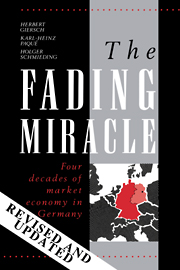Book contents
6 - Two cheers for German unification
Published online by Cambridge University Press: 09 February 2010
Summary
Up to this point, this book has dealt exclusively with the history of economic policy in West Germany, i.e. in one of the two separate states which had emerged from the ashes of the German Reich after the Second World War. Because of the virtual absence of economic exchanges between the eastern and the western part of the divided country from 1945 to late 1989, comparatively small East Germany has hardly been worth mentioning at all in this context. In late 1989, however, the peaceful revolution in East Germany paved the way for the most joyful event in the history of twentieth-century Germany: economic and political unification. West Germany's currency and its economic order were introduced in East Germany on 1 July 1990; political unification followed shortly afterwards, on 3 October. Since then, the devastating heritage which the demise of the Soviet-type command economy had left behind in the East has become a major challenge and concern for economic policy in the new Germany. In the following three sections, we shall briefly summarize what the heritage of the communist command system was for the East German economy by the time when the Berlin Wall came down (Section 1), how economic unification between the two German states was actually carried out and which consequences it had in the short run (Section 2), and what will be the long-run prospects of the eastern German economy in a re-united country (Section 3).
The heritage of a command system
In the aftermath of the Second World War, Germany – and Europe – had been divided into a communist East and a democratic and market-orientated West.
- Type
- Chapter
- Information
- The Fading MiracleFour Decades of Market Economy in Germany, pp. 256 - 272Publisher: Cambridge University PressPrint publication year: 1992

